Chile’s SQM, the world’s second-largest lithium group, witnessed a more than 7% drop in its shares on Thursday, in line with the rest of the sector, as it reported significant declines in revenue, prices, and earnings for the three months ending in September. Like its competitors, including the US-based Albemarle, IGO, Mineral Resources, Livent, and Pilbara Minerals, SQM anticipates further challenges in the coming quarter and into 2024.
During the September quarter and the nine months leading up to September, SQM disclosed lower revenues and earnings. Third-quarter net earnings plummeted by 56.4% compared to the previous year, primarily due to falling lithium prices, which had reached record highs of around $US89,000 per tonne a year ago this month but had since declined by 70% or more for some grades.
Despite producing other products like fertilisers and chemicals, similar to Albemarle’s product range, SQM’s net profit for the September quarter was $US479.4 million, well below the market’s expected $US511.2 million. Revenue for the miner also slumped by nearly 38% to $US1.84 billion during the July to September period.
In its quarterly report, SQM noted, “We reported higher sales volumes during the third quarter of 2023, reaching a historically high level of over 43,300 metric tons, almost 4% higher than the same period last year. Revenues in the lithium business line were affected by almost a 47% lower average price reported during the quarter compared to average prices seen during the third quarter of 2022. Most of our sales contracts are tied to price indices that mirror market price trends, and these indices have experienced a notable decrease since the start of the current year. We believe this trend could continue for the remainder of the year. Given the stock levels of battery materials and lithium chemicals and additional lithium supply entering the market during the year, our sales volumes in the fourth quarter of 2023 could ultimately be similar or lower than the sales volumes reported during the third quarter of 2023.”
SQM’s Chief Executive Officer Ricardo Ramos stated, “The third quarter of 2023 results were impacted by significantly lower average sales prices in the lithium and fertiliser business lines,” but he also noted that this was “partially offset by higher sales volumes compared to the same period last year and higher iodine sales prices.”
For the nine months ending on September 30, SQM reported net income of $US1.809 billion, down 34% from $US2.755.3 billion for the same period in 2022. Revenues for the nine months also fell, totaling $US6.156 billion compared to $US7.577 billion reported for the first nine months of 2022.
Like other producers such as Albemarle, IGO, and Pilbara, SQM plans to stockpile metal and spodumene during this quarter to wait out the continuing slide in prices and weak demand. SQM will build its lithium inventories while continuing to produce at maximum capacity to be prepared for when inventories return to normal levels and customer purchases reactivate.
SQM’s lithium vice-president Carlos Diaz explained, “The idea is to be prepared when inventories return to normal levels and customer purchases are reactivated.”
Felipe Smith, SQM’s senior commercial vice-president for lithium, attributed lower prices to softer electric vehicle (EV) demand outside China and high component supplies, leading to excess inventories across the entire battery supply chain. Smith stated that while building inventories, SQM would contract sales volumes in line with market indices and had also entered into several new long-term index-linked supply deals.
Regarding SQM’s $A1.61 billion bid for Azure Minerals, SQM executives provided no updates in a conference call following the release of the results. However, it’s worth noting that Gina Rinehart’s Hancock Prospecting and Chris Ellison’s Mineral Resources have acquired enough Azure shares (around 33% between them) to block SQM’s offer of $3.52 a share, which has been overbid in the market.

